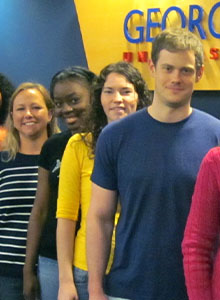Fundamentals Course Offers Confidence
Hands-on case experience, a win for their client and confidence to start their own practice—that's what eight students took away from the Fundamentals of Law Practice Spring 2013 course.
The students obtained four orders of protection against domestic violence from the Cobb County Superior Court under the direction of Clark Cunningham, W. Lee Burge Professor of Law and Ethics, and Tiffany Williams Roberts (J.D. '08), adjunct professor and deputy director of the National Institute for Teaching Ethics and Professionalism.
The students learned general practice and ethical decision-making skills while simulating a firm's case management activities—including time tracking, petitioning courts for billable hours and representing clients. Working in teams of two, they represented persons in Cobb County Superior Court with a week to prepare—conducting interviews and factual investigation and appearing in court under Georgia's Third-Year Practice Act.
"The workload during the week of case preparation is intense," Cunningham says. "The students did a phenomenal job preparing for and presenting their cases. The judge granted orders for each of our four clients, who otherwise wouldn't have had representation."
Since the course was first offered in spring 2010, Cunningham's students have only lost one case. While most cases are settled in negotiations, Cunningham says students do their due diligence in case they proceed to a hearing.
 To prepare for their case, Kathy Mulcahy (J.D. '13) and Katrina Thomas, who audited the course, obtained 911 records, role-played and practiced cross-examinations with other students. Roberts counseled them on how to effectively advise their client, and they obtained an order that provided everything their client requested. The experience gave each of them a more thorough understanding of the law.
To prepare for their case, Kathy Mulcahy (J.D. '13) and Katrina Thomas, who audited the course, obtained 911 records, role-played and practiced cross-examinations with other students. Roberts counseled them on how to effectively advise their client, and they obtained an order that provided everything their client requested. The experience gave each of them a more thorough understanding of the law.
"This course is so important," Thomas says. "I learned much more about professional conduct, my responsibilities as an attorney and the rules affiliated with case work."
Katherine Perry (J.D. '13) and Heath Bassett (J.D. '13) also spent time gathering evidence and reviewing 911 tapes to help establish client credibility. "It was a lot of prep work, probably 30 to 40 hours to get ready, read up on the body of law and gather evidence," Bassett says.
After Perry's opening statement and Bassett's direct examination of the client, the judge said he had heard sufficient evidence to grant an order of protection and took a break in the hearing to encourage negotiation, which resulted in a consent order.
Evan Margulis (J.D. '13) and Jennifer Jarvis (J.D. '13) spent time visiting various counties, courtrooms and police departments to gather evidence. Their judge encouraged negotiations, but the opposing counsel pressed for a hearing. They were the only two who took their case through a complete court hearing.
"I feel less intimidated about starting my own firm now. I have courtroom experience to talk with potential clients about. Professor Roberts explained the various aspects of running your own private firm," says Margulis. "Also, the law manual from the course essentially outlines what ducks you need to get in a row to start your own practice... This course was a lot of work, but teaches you how to actually be a lawyer."
Cunningham and Roberts also arranged for each student to have fieldwork experience with a solo or small firm attorney practicing in an area of their interest. Practicing attorneys also participated in a number of classes.
"Team teaching was really helpful. We learned how to deal with real people and real problems versus text book learning," says Tom Flugum Jr. (J.D. '14).
"I am so appreciative for the actual hands on experience we gained from this course," Mulcahy says. "I have so much respect for what I've learned from professors Roberts and Cunningham. I'm not planning to start my own firm, but now I'm confident that I could."